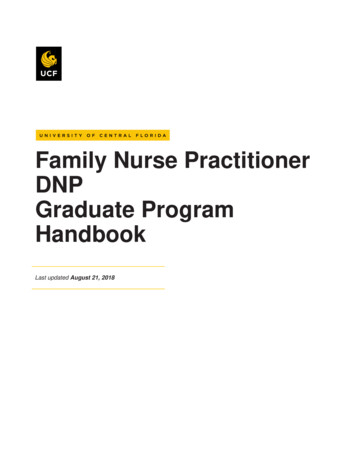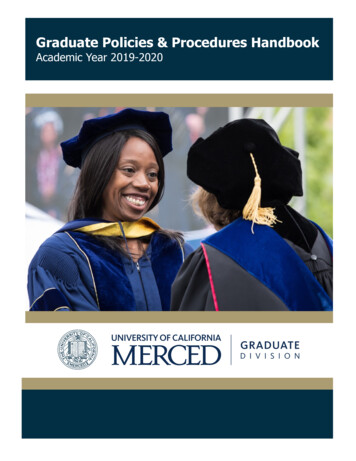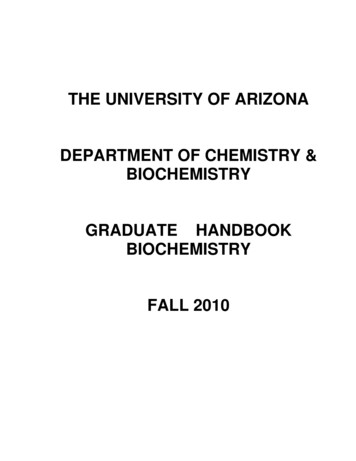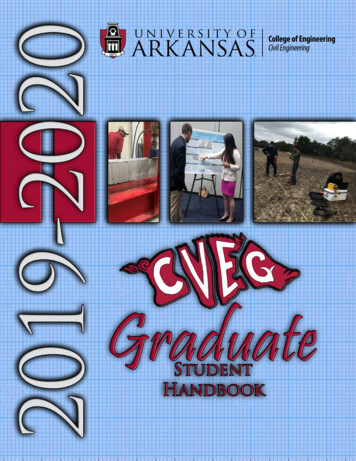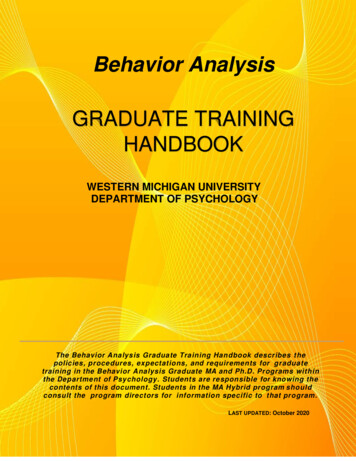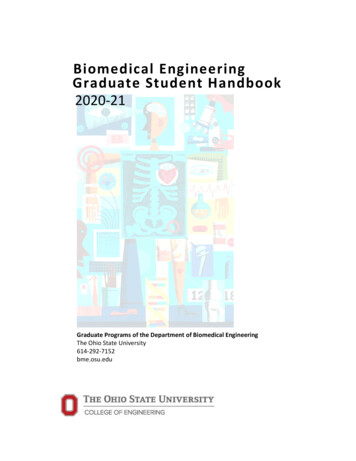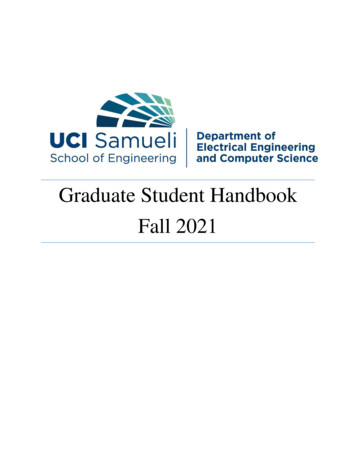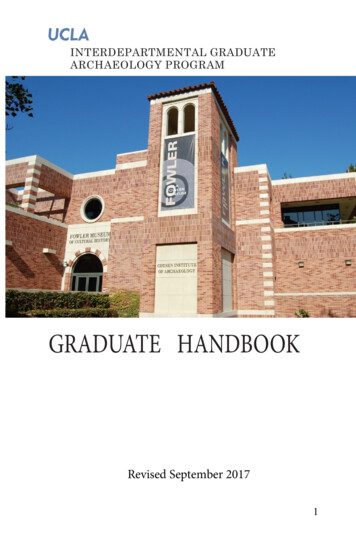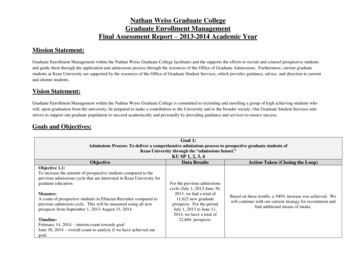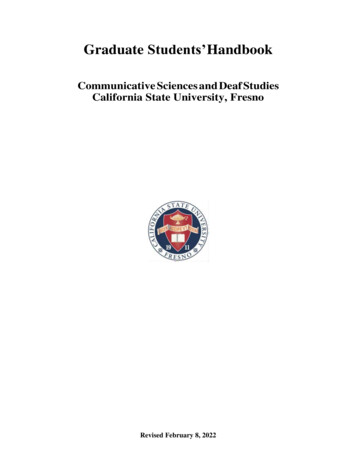
Transcription
Graduate Students’ HandbookCommunicative Sciences and Deaf StudiesCalifornia State University, FresnoRevised February 8, 2022
Table of ContentsIntroduction . 3Graduate Admission Requirements . 4Information for Post-Baccalaureate Students . 5Graduate Student Standing .6Information for students admitted into the program on a conditional status . 6Graduate-Level Writing Competence . 6CSDS Graduate Writing Evaluation Process . 7Graduate Writing Skills Appeal Process . 7Advancement to Candidacy . 7Advancement to Candidacy: Eligibility . 7Advancement to Candidacy Policies . 8Residency . 8Transfer Credit . 9Continuing Education . 9Courses Not Permitted For Degree Fulfillment . 9Credit by Examination . 9Credit/No-Credit Courses . 9Post-baccalaureate/graduate credit taken prior to the granting of the baccalaureate degree . 9Plagiarism and Cheating . 10Departmental Policy . 10Departmental Procedure . 10Academic Probation and Disqualification . 11Policy on Petitions for Disqualified Readmission . 11Financial Aid . 12Culminating Experience. 12Comprehensive Examination . 12Thesis . 13Graduate Project . 13Thesis or Project Research Involving Human Subjects and Animal Subjects. 14Comprehensive examinations . 14Examination Procedures . 16Written Comprehensive Examinations . 16Grading of the Comprehensive Examinations . 16Oral Comprehensive Examinations . 17Comprehensive Examination Retake Policy . 17Speech-Language Pathology Complaint Procedure . 17Graduation Information . 19Student Support Resource. 21Graduate Students Handbook Revised: 2/8/22Page 2 of 22
IntroductionThe Communicative Sciences and Deaf Studies department offers graduate programsleading to an MA in Speech-Language Pathology (SLP) and an M.A. in DeafEducation (DE). The master's degree is considered essential for the professional trainingneeded for effective practice in Deaf Education or Speech-Language Pathology. Themaster's degree generally involves about 2 years of full-time study.The Master of Arts degree in Speech-Language Pathology is a 36-unit graduate programand the Master of Arts degree in Deaf Education is a 30-unit graduate program. However,students will be taking additional units beyond these. Deaf Education students willcomplete 18 units (600 hours) of DHH field experience (externships, student teaching,etc.) Speech-Language Pathology students will complete a number of clinicalpracticums. The first three semesters of practicum will be completed in the department'sLanguage, Hearing and Speech Clinic; the remaining two semesters are completed offcampus in department-approved placements. These practicums add an additional 25 to35 units to the student's program.Both programs are cohort programs in which students move through their classes is apredetermined sequence with the other members of their cohort. The course sequence foreach program is presented below.COURSE SEQUENCE for SPEECH LANGUAGE PATHOLOGYSPRING ADMISSIONSSpringCSDS 200CSDS 214CSDS 220CSDS 230Summer*optional230placement, ifavailableFallCSDS 207CSDS 215CSDS 213CSDS 230SpringCSDS 216CSDS 221CSDS 204*CSDS 230 (or257/267 if230s are done)Summer*CSDS 267FallCSDS 210CSDS 218CSDS 202*CSDS 209/257(or 267 ifstill needed)*As always clinic assignments may vary depending on need and availability per the clinic directorFALL ADMISSIONFallCSDS 200CSDS 214CSDS 220CSDS 230SpringCSDS 207CSDS 215CSDS 213CSDS 230SummerCSDS 230FallCSDS 216CSDS 218CSDS 210*209/257 or 267SpringCSDS 221CSDS 204CSDS 202*209/257 or 267*As always clinic assignments may vary depending on need and availability per the clinic directorGraduate Students Handbook Revised: 2/8/22Page 3 of 22
COURSE SEQUENCE for DEAF EDUCATION (Fall admission only)FallCSDS 201CSDS 203CSDS 271CSDS 260SpringCSDS 206CSDS 255CSDS 272CSDS 260FallCSDS 262CSDS 263CSDS 264CSDS 273SpringCSDS 258 or 268Application Requirements for the Department ofCommunicative Sciences & Deaf StudiesDepartment Application DeadlinesDepartment DeadlineDeaf EducationSpeech-Language PathologyFALLadmissionApril 1March 1SPRINGadmissionN/AOctober 1Graduate Admission RequirementsThe graduate program is open to students with a bachelor’s degree in communicativesciences. Applicants who have a degree in another field will be required to completethe undergraduate courses for their emphasis. Applicants must have demonstrated theability to excel at an advanced level as well as indicated great potential for success inacademic work and clinical work. In order to be considered for admission to the graduateprogram in CSDS, the applicants must have an overall G.P.A. of 3.0 or greater, as wellas for their last 60 semester units (90 quarter units) of coursework and CSDS majorcourses. To apply for graduate study in the Department of CSDS, you need to apply tothe university and to the department by completing the following two (2) steps.Step 1. Apply to the University1. Submit your application online via Cal State Apply. You will select the MastersDegree in Speech-Language Pathology or Deaf Education.2. Submit one official transcript from each college that you attended after highschool tothe university.3. Submit one copy of GRE scores to Fresno State Graduate Admissions.Graduate Students Handbook Revised: 2/8/22Page 4 of 22
Step 2. Apply to the Department – Speech-Language PathologyYou will be required to submit the following online via Cal State Apply.1. Department application.2. Statement of Purpose (aka: Letter of Intent). See Department website for moreinformation.3. Three Letters of Recommendation. Once you enter Cal State Apply, you will beasked to provide the names and email addresses of 3 individuals who will provideletters of recommendation electronically.4. Observation Hours. If you are applying to our Speech-Language Pathology program,you need to submit documentation of 25 hours of Supervised Clinical Observations.If you have completed your hours, please upload the documentation when you apply.If you have not completed your hours, you will be asked to provide documentationbefore starting the program.5. Prerequisite Tracking Form. If you are applying to our Speech-Language Pathologyprogram and your BA degree is from another field, please submit the SLPPrerequisite Tracking Form, found on our Departmental website.Step 2. Apply to the Department – Deaf EducationAfter you have completed the CSU application via Cal State Apply, you will be iltosmurray@mail.fresnostate.edu.1. Cal State Apply confirmation email2. Departmental Application, found on our Departmental website.3. Statement of Purpose (aka: Letter of Intent). See Department website for moreinformation.4. In addition, you will be required to provide 3 letter of recommendation using theLetter of Recommendation form (found on our Departmental website). Please selectindividuals who can speak to your interpersonal skills, growing professionalism,and/or academic potential. If possible, these should be course instructors, or otherpersons within the field of Deaf Education. Forms must be signed and dated bythe applicant before it is given to a recommender. Recommenders mustcomplete the form and email it directly to smurray@mail.fresnostate.edu bythe deadline.For International Students, contact the University's Office of International Admissions.International applicants must have a minimum TOEFL Total Score of 100 to beconsidered for admission to the department's graduate programs.Information for Post-Baccalaureate StudentsStudents who have earned an undergraduate degree in a major other than SpeechLanguage Pathology or Deaf Education need to complete a number of requiredprerequisite courses before they are admitted into the graduate program. Contact theGraduate Coordinator for more information.Graduate Students Handbook Revised: 2/8/22Page 5 of 22
Graduate Student StandingInformation for students admitted into the program with full classificationstatus.This category is granted to those students who fully meet all university and programadmission requirements. It enables the student to pursue a graduate degree and fulfillall of the professional, personal, scholastic, and other standards (including qualifyingexaminations) prescribed by the campus.In consultation with your academic advisor and the graduate program coordinator, youshould petition for advancement of candidacy at the beginning of your second semesterof graduate studies. If you are planning to do a thesis as a culminating experience, it isessential that you be advanced to candidacy at the beginning of the second semester ofgraduate studies. Advancement to Candidacy forms can be found s/forms/.Information for students admitted into the program on a conditional status.Students may be admitted to a graduate degree program in this category if, in theopinion of the appropriate campus authority, the student can remedy deficiencies byadditional preparation, including the combination of prerequisite requirements.Students who have been granted conditionally classified admission to a graduateprogram are required to complete all conditions for achieving classified status (fulladmission) to the program by the semester in which a maximum of 10 units to be usedtoward the master's degree is completed. Failure to attain classified graduate standingin a timely manner as outlined in the catalog may result in the loss of units to be appliedtoward the degree since units in excess of 10 prior to classification may not be listed onthe Petition of Advancement to Candidacy.A student is expected to attain classified graduate standing either at admission or duringthe first semester of studies. Candidates for classification are expected to possess aminimum 3.0 post-baccalaureate cumulative grade point average.It is your responsibility to meet the conditions specified in your letter of admission intothe graduate program. As soon as you have met the conditions, please see the graduateprogram coordinator to initiate the request for classification.Graduate-Level Writing CompetenceCalifornia State University, Fresno requires that students have graduate-level writingabilities before being advanced to candidacy for the master's degree. Students candemonstrate these abilities by passing the writing component of the CSDS 200 or 203course and obtaining written clearance from the instructor.Graduate Students Handbook Revised: 2/8/22Page 6 of 22
CSDS Graduate Writing Evaluation ProcessThe CSDS graduate writing evaluation process has two components to it.1. The in-class spontaneous essay writing on an academic or general issue or topic,and2. Completing a research paper according to the APA format. The research paper is anextensive assignment, prepared with in-depth research into the topic and theresearch design. It is usually a treatment efficacy study.If students fail either or both of these components, the remedies are as follows:1.Students who fail the in-class writing test are given two more opportunities to pass: eachof these in-class essays will be on a different topic or issue.2.Students who fail to meet the research paper component of the graduate writingevaluation also will have two additional opportunities to revise and resubmit theirproposal. The professor will provide written comments about the students' papers.The students can revise their papers and resubmit them, usually within a previouslyagreed upon time period but no later than the end of the first month after classesstart in the following semester.Graduate Writing Skills Appeal Process.If a student decides to appeal any graduate matters, including the graduate writingevaluation, the student should submit an appeal in writing to the departmental graduatecoordinator. After reviewing the recommendations of the graduate coordinator, thedepartment chair will make the final recommendation on the appeal.Advancement to Candidacy.Advancement to Candidacy: EligibilityClassified graduate standing gives a student permission to work toward qualifying forcandidacy. Advancement to candidacy gives a student permission to proceed towardqualifying for the degree and provides the student with a program of study that hasbeen officially reviewed and approved by both the Graduate Coordinator and by theGraduate Dean. This important step confers on the student the status of candidate forthe degree and represents a commitment both on the part of the student and the degreeprogram to complete the degree within a specified time limit according to requirementspublished in a specific university catalog year. Advancement to candidacy is essential tothe student in planning for registration in courses. The student should therefore meetwith his/her graduate program coordinator soon after attaining classified graduatestanding to discuss advancement to candidacy.Advancement to candidacy must be attained no later than the semester (or summer)preceding the semester (or summer) in which the student begins the culminating experience.Campus policy requires a student to petition for advancement to candidacy as soon ashe/she becomes eligible to do so. Normally, this should occur within one semester ofhaving attained classified graduate standing. Compliance with this policy is necessaryGraduate Students Handbook Revised: 2/8/22Page 7 of 22
for a student to remain in good standing. All students in graduate standing must alsodemonstrate a satisfactory level of scholastic, professional, and ethical competence asdetermined by program faculty to be eligible to continue in the graduate program.Eligibility requirements for advancement to candidacy include the following:1. A student should be classified by the semester in which a maximum of 10 unitsto be used toward the master's degree are completed. Not more than 10 units(including transfer and post-baccalaureate credit) completed before achievingfull classified graduate standing at California State University, Fresno may belisted on the Petition of Advancement to Candidacy. Courses taken during thesemester in which the student is classified may also be listed on the Petition ofAdvancement to Candidacy.2. Completion of any additional prerequisites which the Graduate Coordinator orDepartment Chair specifies in writing.3. Completion in graduate standing at California State University, Fresno of at least9 units of the proposed program with a 3.0 grade point average on all completedwork appearing on the Petition of Advancement to Candidacy.4. All graduate students must demonstrate their competence in written Englishprior to advancement to candidacy. Early completion of this requirement isrecommended. The date the student met the graduate writing requirement mustbe noted on the Petition of Advancement to Candidacy form. See approvedprogram requirements.5. Submission to the Division of Graduate Studies of the properly signed Petition ofAdvancement to Candidacy. Petitions are available on the Division of GraduateStudies website and are designed for each graduate program /forms/atc.html.6. The student is responsible for adhering to deadlines established by the GraduateDivision for the submission of advancement forms. Forms received after thedeadlines are considered late and will be processed as time allows. Studentscannot be advanced to candidacy and graduate in the same semester.Advancement to Candidacy PoliciesThe approved degree program for the master's degree is a coherent pattern of (1)specific requirements for the program and (2) additional courses selected to meet thestudent's particular needs. It consists of at least 36 units, which must be completedwithin 5 years just preceding the granting of the master's degree. Only graduate courses(200 series) and such upper-division courses (100 series) as are recommended by thecolleges, schools, or departments and approved by the University Graduate Committeeare acceptable on the unit requirement. Other courses are counted in calculating thestudent's study load and cumulative post-baccalaureate GPA, but cannot be countedtoward the unit requirement for the master's degree. Courses that were used to satisfythe requirements of a previous degree may not be used on the program. The approvedprogram must be consistent with the following policies.ResidencyAt least 26 units of a 36-unit SLP program or 20 units of the 30-unit DE program mustbe residence credit (courses taken through regular enrollment at California StateGraduate Students Handbook Revised: 2/8/22Page 8 of 22
University, Fresno). No more than 10 units of transfer and/or California StateUniversity, Fresno Extension credit may be included in the 36-unit program.Transfer CreditTransfer credit may be used toward a California State University, Fresno master's degreeonly if the institution offering the work is accredited (A-rated) and would accept it for acomparable master's degree program. The off-campus institution must also have listedthe units as post-baccalaureate graduate units on the student's transcript. Credit atCalifornia State University, Fresno will be granted if it is judged by appropriateuniversity authorities to be particularly relevant to the individual student's program.The student must present appropriate documentation, including official transcripts ofwork completed and copies from the catalog of the institution where the transfer workwas taken, as follows: the relevant course description(s), evidence that the course(s)may be used toward a graduate degree at that institution, the course numbering andgrading systems, and information clarifying whether the institution used the semesteror quarter system.Continuing EducationCourses taken through Continuing and Global Education (Extension and/or OpenUniversity) are not normally used to fulfill the requirements toward a master's degree.Students intending to take a course through the Division Continuing and GlobalEducation must request special permission from their graduate program coordinator touse the course toward their program. If approved, a maximum of 10 transfer (includingCalifornia State University, Fresno Extension and/or Open University) units may beused on a 36-unit program. Students may not enroll through Open University in orderto bypass the university fee structure.Courses Not Permitted for Degree FulfillmentCourses used to fulfill G.E. curriculum (Capstone, Integration, orMulticultural/International), undergraduate writing W courses, lower-division courses,and professional (300-level) courses may not be used in fulfillment of the programrequirements of the master's degree.Credit by ExaminationCredit by Examination (CBE) may be used to fulfill prerequisites, but may not applytoward the master's degree program.Credit/No-Credit CoursesGraduate students may not elect to take a course for a CR grade to fulfill eitherprerequisite or major program requirements unless the course is only available forCR/NC grading as indicated by class note 14 in the Class Schedule.Post-baccalaureate/graduate credit taken prior to the granting of thebaccalaureate degreeWith approval of the graduate program coordinator, post-baccalaureate/graduatecredit allowed for work taken prior to the granting of the baccalaureate degree may beGraduate Students Handbook Revised: 2/8/22Page 9 of 22
applied toward a master's degree. However, the amount of post-baccalaureate creditused toward the master's degree may not exceed one-third of the student's entireapproved program.Courses may not be included on the advancement to candidacy petition if they do notfall within the 5-year limit. A minimum of 70%of the courses in a student's program forthe master's degree must be graduate-level courses numbered in the 200 series.Substitutions for regular departmental requirements must be approved by the graduateprogram coordinator and noted on the front page of the Petition for Advancement toCandidacy.Plagiarism and CheatingAPM 235 is the official policy and procedures for Cheating and Plagiarism. Thisdepartmental policy is designed to further define requirements of APM 235 at thedepartmental level.Departmental PolicyAll CSDS faculty will use their discretion when working with a student on “drafts” ofassignments, papers, and/or possible instance of cheating. All CSDS faculty arerequired to utilize the plagiarism software “TurnItIn” for substantial written work suchas a research paper or written final exam. All CSDS faculty have “the prerogative oflowering a grade, assigning a grade of “0” or “F” for the text/paper, assigning an “F”for the entire course, or recommending another penalty that seems appropriate” (APM235, p. 2). Examples of previous academic sanctions include but are not limited to:Earning a “0” for the assignment Earning only partial credit for an assignment or final exam question Earning a “0” for the assignment and one letter grade lower than the one earned (i.e.,Student was given a zero for the assignment and had an 82% in the course that wasthen lowered to a “C” for the final grade) Being removed from the class and earning a “0” on the exam (continuous eye gaze onthe exam of a peer)CSDS faculty will be kept informed during the process via email or departmentalmeeting(s). If the student is majoring in CSDS, the faculty advisor will be notified at thebeginning of this process by the chair along with the graduate coordinator if applicable.Departmental ProcedureEach faculty member shall immediately notify the department chair of instances ofcheating and/or plagiarism. Details of the alleged cheating and/or plagiarism mustinclude: Course and section Student name and ID number Documentation of cheating (see APM 235 Appendix A) or plagiarism (see APM 236Appendix B) including a description of the allegation(s) Faculty recommendation for academic sanction(s)Graduate Students Handbook Revised: 2/8/22Page 10 of22
The department chair will acknowledge receipt of the documentation via email to thefaculty and the administrative support coordinator will place the information in theCSDS electronic Cheating and Plagiarism folder. The faculty member will then followthe required procedures outlined in APM 235 section 1 Part C. The CSDS electronic filewill be updated upon the conclusion of the departmental process for Cheating andPlagiarism. If an appeal is made to the chair and/or university Academic PetitionsCommittee, the outcome will be included in the CSDS electronic file.Academic Probation and DisqualificationGraduate students in the Department of Communicative Sciences and Deaf Studiescan be disqualified if (1) their Cumulative GPA falls below 2.0, (2) they are on AcademicProbation for any two semesters (they need not be consecutive semesters), or (3) theyreceive a grade of C or lower in three or more classes. Students who meet criterion 1 or2 are disqualified from the university; students who meet criterion 3 are disqualifiedfrom their graduate program.Disqualifications are made after grades have been posted for the semester. Upondisqualification, the student is disenrolled from all of their next semester classes (forstudents disqualified from the university) or from their classes in their graduateprogram (for students disqualified from their graduate program). Students are notpermitted to enroll in these classes during the semester following their disqualification. If thestudents are readmitted, they may not enroll until the semester following their readmission tothe University or program.Policy on Petitions for Disqualified ReadmissionDisqualified students may petition to be readmitted to the university or graduateprogram. They must complete the following steps:1. They must complete the following to initiate the Petition.a. The Petition for Readmission of Disqualified Graduate Student (available .b. A one-page letter describing the circumstances leading to disqualificationand a plan to remediate their deficiencies in GPA or grades.c. Any documentation supporting claims made in their letter or petitionform.2. They must meet with the Department’s Graduate Coordinator and at that timeprovide all documents listed in step 1. University policy requires a meeting withthe Graduate Coordinator. The deadlines to complete steps 1 and 2 are the sameas the application deadlines for fall and spring semester admission; check withgraduate admissions for the dates. No petitions may be submitted during the summeror before the start of a semester.3. The Graduate Coordinator will forward the petition and documents to thegraduate faculty of students’ graduate program4. A meeting of the graduate faculty of students’ graduate program and the GraduateCoordinator will be held to review the student’s petition and make arecommendation.Graduate Students Handbook Revised: 2/8/22Page 11 of22
5. The Graduate Coordinator will provide to the student, in writing, therecommendation of the program graduate faculty. This recommendation will bemailed to the student.6. The student has the right to appeal the decision of the department to the Dean ofthe Division of Graduate Studies (in cases of disqualification from the University)or to the Dean of the College of Health and Human Services (in cases ofdisqualification from the graduate program).Financial AidFinancial aid funding levels are determined by the unit totals for a program as stated inthe university catalog. Speech-Language Pathology is listed as a 36-unit program.However, students will take an additional 25-35 units of practicum. The result is thatSLP students may exceed their funding levels during their graduate program.Students receiving loans may need to complete a Maximum Unit Petition, whichrequires verification from the student's academic advisor included with thepetition. Petition instructions are available from the Financial Aid website. Studentsreceiving grants will be funded to a set number of units; extension is not available.Students receiving a grant would need to seek an additional funding source once themaximum units have been reached. Financial aid forms and information are ialaid/.It is the student's responsibility to keep track of the maximum units permitted andprepare to respond accordingly before the
Graduate Students Page Handbook Revised: 2/8/22 7 of 22 CSDS Graduate Writing Evaluation Process The CSDS graduate writing evaluation process has two components to it. 1. The in-class spontaneous essay writing on an academic or general issue or topic, and 2. Completing a research paper according to the APA format. The research paper is an

